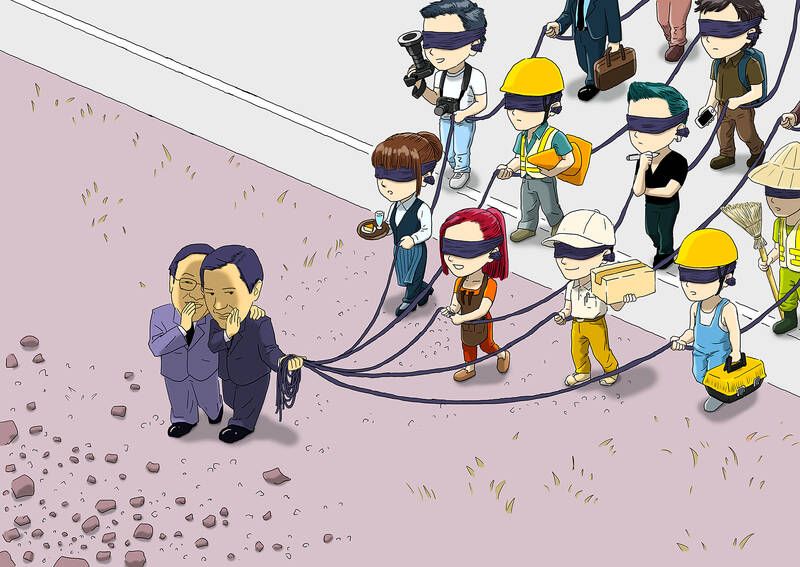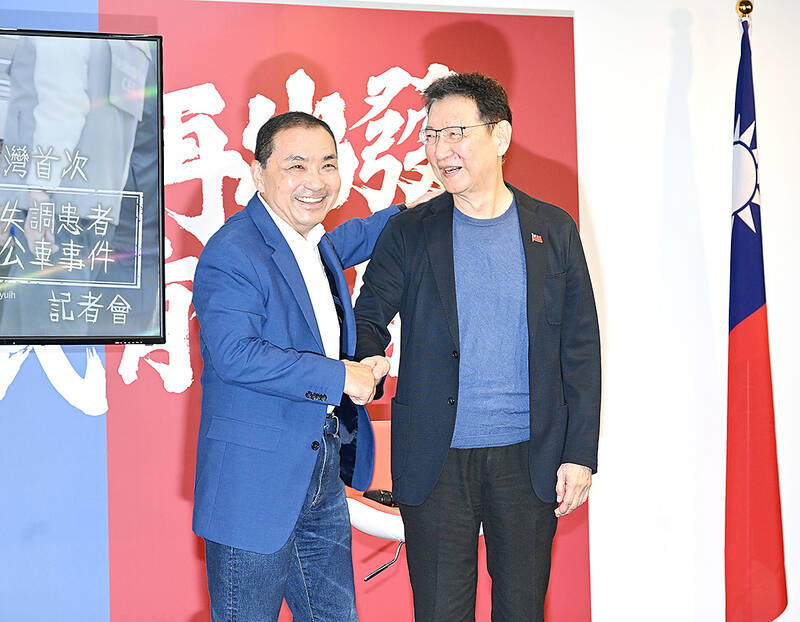In central Taiwan, a friend informs me, there’s a major business man, definitely not a gangster, who also has operations in the People’s Republic of China (PRC). Before the Democratic Progressive Party (DPP) took over in 2016, he had plans to hand out “student” visas for “internships” for his young workers in the PRC, who would then come here for “study.” They would provide him with free labor for his entertainment operations here, and then return to the PRC to work in his businesses there.
Recently Chinese Nationalist Party (KMT) presidential candidate Hou You-yi (侯友宜) announced that he would open the gates to Chinese students. The visa program already suffers from egregious systemic abuses and lax oversight, as repeated cases of non-white students used as factory labor show. With Hou in power, this might well become institutionalized. And people like the businessman above will benefit.
I have written elsewhere how presidential candidates Ko Wen-je (柯文哲) of the Taiwan People’s Party (TPP) and Hou have used the 2008 and 2012 approach of former President Ma Ying-jeou (馬英九) of the KMT to try and appeal to local voters while maintaining their deep blue identity (Taipei Times, “The ‘services pact’ rises from its grave,” June 26, 2023). Ko has been slowly falling in the polls since the KMT’s successful attempt to badly wound him with the faux “joint ticket” plan (Taipei Times, “Hou-Ko: 2008 redux,” Nov. 27, 2023).

Photo courtesy of Wikimedia Commons
Hou, however, has risen a bit in the polls as voters shift around.
In the last few weeks Ma has encysted Hou in a cocoon of deep blue Mainlander politicians. His campaign manager is Ma’s hatchet man, King Pu-tsun (金溥聰). His Vice Presidential candidate is a deep-blue bitter-ender and media personality Jaw Shaw-kong (趙少康). If the KMT wins the legislature, the speaker will be another deep blue mainlander, Han Kuo-yu (韓國瑜), the KMT’s 2020 presidential failure.
Surrounding Hou with deep blue mainlanders was Ma’s way of consolidating the deep blue base and reassuring the aging mainlander core of the party that the Taiwanese Hou would remain under Party control. It also means that Hou’s major policies are likely to be reprises of the Ma era. The KMT is offering nothing new.

Photo: Peter Lo, Taipei Times
Hou has already announced that he supports reviving the cross-strait service trade agreement (CSSTA), the unpopular services pact that the Sunflower movement killed in 2014. The expansion in PRC students is of course vintage Ma, part of Ma’s larger project of bringing Chinese over any way possible. Ma also proposed the “free economic zones,” essentially miniature banana republics, to bring in Chinese labor. At the time DPP Legislator Wu Ping-jui (吳秉叡) said: “Thirty-three of the 73 articles in the special act are blank authorizations, which give almost unlimited authority to administrative bodies of the free economic pilot zones.”
Ma’s China policies also called for financial integration of Taiwan with China. In his 2013 Double Ten day speech he expressed the hope that the free economic zones would include financial services. Because the zones were largely outside government regulation, the central bank killed the idea, arguing that it would enable unregulated trade of the Taiwan Dollar with the outside world.
Worse than that, as many noted at the time, banks would have been able to move transactions into the zones, thus placing them outside financial regulations. The spike in financial fraud would have been gargantuan. CommonWealth Magazine documented last month in an excellent article on Taiwan’s booming fraud industry, “Taiwan’s White Collar Fraud Infiltrating Banks,” that financial fraud is booming and that there are now more fraudsters than drug criminals in Taiwan’s prisons.
Why has Hou revived the trade agreement? Because the ultimate goals of Ma’s China policy were always financial integration and flooding Taiwan with Chinese, in any way possible. Financial integration was in turn about getting Chinese Communist Party (CCP) money into Taiwanese financial firms and subordinating them to the PRC, part of the PRC’s long-term plan to subsume Taiwan. Given China’s current economic woes, imagine if Ma had been successful and Taiwanese financial firms were even more exposed in that market.
Few now remember the AIG-Nan Shan-Primus deal of 2010, which brewed into a major scandal. AIG sold Nanshan, then Taiwan’s largest insurer with 4 million Taiwanese under its coverage, to Primus Financial for US$2.15 billion. Over the spring it emerged that the consortium backing Primus included individuals under suspicion of financial crimes and irregularities, CCP princelings, money from state firms and shell companies in terrible financial shape. It was a whirlpool of murky money flows and, as a sturdy Taipei Times editorial (“The devil is in the details,” April 2, 2010) noted at the time, an augury of the future.
These policies are already on full replay. This fall Ma visited New York, where he hobnobbed with his old pal Jerome Cohen, who writes often on Ma, and always extolling him, even for tiniest things, as in 2009 when Cohen wrote in the Wall Street Journal explaining why it was so wonderful that Ma had broken his promise not to run for KMT party chairman while president (Taipei Times, “Chairman Ma’s Challenge,” July 27, 2009).
On that visit Ma was interviewed by Stephen A Orlins, head of the National Committee on US-China Relations (NCUSCR) and before that, of Lehman and Carlyle, both powerful financial firms. Like Ma, he has old connections to Cohen. A month later Orlin’s NCUSCR, along with the equally pro-PRC US-China Business Council, would go on to organize the infamous dinner with Xi Jinping (習近平) on Nov. 15 at the Asia-Pacific Economic Cooperation summit, at which hundreds of US business leaders feted the dictator and mass murderer.
If Hou ever becomes president, I expect US financial leaders to put great pressure on Taiwan to engage in “financial integration” with its mortal enemy, and a Hou administration to attempt to open the nation to PRC financial firms.
This will be presented as a “peace” move, and accompanied by clouds of “pro-peace” articles in the major media from the usual suspects, like B-17s tossing out chaff before hitting Hamburg.
Unless PRC troops actually hit Taiwan’s beaches, that will be Taiwan’s most desperate fight. I hope we never have to face it.
Notes from Central Taiwan is a column written by long-term resident Michael Turton, who provides incisive commentary informed by three decades of living in and writing about his adoptive country. The views expressed here are his own.

Following the rollercoaster ride of 2025, next year is already shaping up to be dramatic. The ongoing constitutional crises and the nine-in-one local elections are already dominating the landscape. The constitutional crises are the ones to lose sleep over. Though much business is still being conducted, crucial items such as next year’s budget, civil servant pensions and the proposed eight-year NT$1.25 trillion (approx US$40 billion) special defense budget are still being contested. There are, however, two glimmers of hope. One is that the legally contested move by five of the eight grand justices on the Constitutional Court’s ad hoc move

Stepping off the busy through-road at Yongan Market Station, lights flashing, horns honking, I turn down a small side street and into the warm embrace of my favorite hole-in-the-wall gem, the Hoi An Banh Mi shop (越南會安麵包), red flags and yellow lanterns waving outside. “Little sister, we were wondering where you’ve been, we haven’t seen you in ages!” the owners call out with a smile. It’s been seven days. The restaurant is run by Huang Jin-chuan (黃錦泉), who is married to a local, and her little sister Eva, who helps out on weekends, having also moved to New Taipei

The Directorate-General of Budget, Accounting and Statistics (DGBAS) told legislators last week that because the Chinese Nationalist Party (KMT) and Taiwan People’s Party (TPP) are continuing to block next year’s budget from passing, the nation could lose 1.5 percent of its GDP growth next year. According to the DGBAS report, officials presented to the legislature, the 2026 budget proposal includes NT$299.2 billion in funding for new projects and funding increases for various government functions. This funding only becomes available when the legislature approves it. The DGBAS estimates that every NT$10 billion in government money not spent shaves 0.05 percent off

Dec. 29 to Jan. 4 Like the Taoist Baode Temple (保德宮) featured in last week’s column, there’s little at first glance to suggest that Taipei’s Independence Presbyterian Church in Xinbeitou (自立長老會新北投教會) has Indigenous roots. One hint is a small sign on the facade reading “Ketagalan Presbyterian Mission Association” — Ketagalan being an collective term for the Pingpu (plains Indigenous) groups who once inhabited much of northern Taiwan. Inside, a display on the back wall introduces the congregation’s founder Pan Shui-tu (潘水土), a member of the Pingpu settlement of Kipatauw, and provides information about the Ketagalan and their early involvement with Christianity. Most